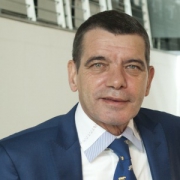Made in Cameroon: Touch Screen for mHealth
A 24 year-old Cameroonian has invented a touch screen medical tablet that enables heart examinations such as the electrocardiogram (ECG) to be performed at remote, rural locations while the results of the test are transferred remotely to specialists for interpretation.
The touch screen tablet – Cardiopad was invented by Arthur Zang, a young computer engineer born and trained in Cameroon at the Ecole Nationale Supérieure Polytechnique (ENSP) in Yaounde.
According to Zang, the Cardiopad is “the first fully touch screen medical tablet made in Cameroon and in Africa.” He believes it is an invention that could save numerous human lives, and says the reliability of the pad device is as high as 97.5%. Zang says he invented the device in order to facilitate the treatment of patients with heart disease across Cameroon and the rest of Africa. So far, several medical tests have been carried out with the Cardiopad which have been validated by the Cameroonian scientific community.
“The tablet is used as a classical electrocardiograph device: electrodes are placed on the patient and connected to a module that, in turn, connects to the tablet. When a medical examination is performed on a patient in a remote village, for example, the results are transmitted from the nurse’s tablet to that of the doctor who then interprets them, says Radio Netherlands.”
While doing his academic internship at the General Hospital of Yaounde, in 2010, Arthur Zang became aware of the difficulties faced by Cameroonians in accessing care related to the heart. The Central African country has an approximately 40 cardiologists for about 20 million population with almost all these cardiologists located in the two large cities of Yaounde and Douala.
Access to cardiologist by patients especially those living in remote cities is therefore a huge challenge. This severe deficit of medical personnel means that patients with heart ailments usually have to travel long distances to undergo heart examinations and consult with doctors. Even at that, it is still not easy. On some occasions, patients must make appointments months in advance, and some even die in the process of waiting for their appointment.
This is how the technology works. Both the cardiologist (in the city) and the nurse (in the remote community) need to have the Cardiopad. A patient in the remote community is connected to electrodes placed on his heart. These electrodes are connected to a module called Cardiopad Acquisition Mobile (CAM) via a Bluetooth interface, which transmits the heart signal to the Cardiopad after the signal has been digitized. The nurse can then read the heart beats, heart rate, and the intervals between each beat displayed on the Cardiopad, etc. All these data are then stored in a file and sent to the cardiologist’s Cardiopad via a mobile telecommunication network.
The Cardiopad is already generating a lot of interest in African tech and medical circles. Zang believes his invention will cut down the cost of heart examinations and he is currently looking for venture capital to commercially produce the device. Visit here for detailed information on the Cardiopad and its inventor.









































